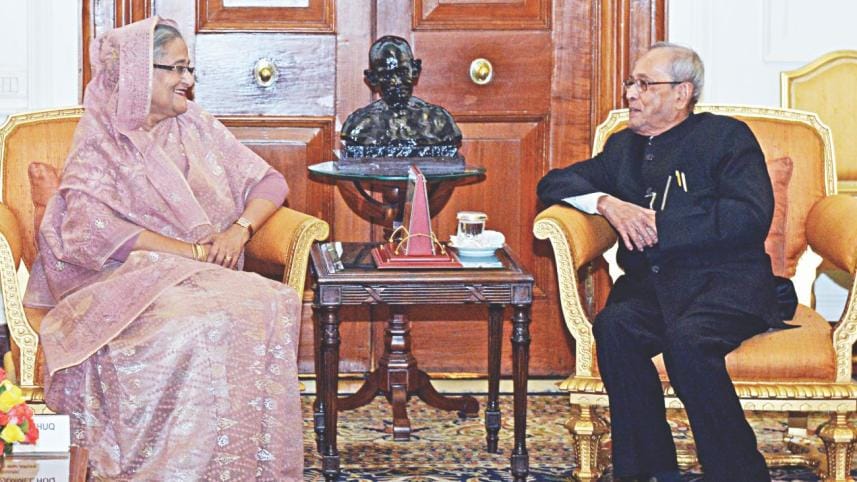It's no fault of Teesta

West Bengal Chief Minister Mamata Banerjee is right in proclaiming that the Teesta does not have much water to share with Bangladesh. And she explained why -- many a dam and hydropower plant has been built in the upstream state of Sikkim where the river originates.
What she did not say, however, is that in her own state, the government built the Gajoldoba barrage near Shiliguri in the late 1990s to tap the Teesta water for irrigation and power generation.
It is no wonder, then, the average flow of the Teesta in the last 10 days of March, the peak of the lean period, dropped to 315-550 cusecs over the last few years. It used to be over 6,000 cusecs back in the 70s and 80s, when there were no dams or power units, according to Bangladesh government data.
Due to such withdrawal and diversion of water in the upstream, the transboundary river runs dry as it reaches Bangladesh, forcing Dhaka to abandon the planned second phase of Teesta barrage project meant to help irrigation. The impact on farming and the livelihoods of the people in northern districts has been huge.
Protracted talks over the Teesta water sharing between India and Bangladesh have been going on for the past 20 years, with West Bengal weighing its own stake on the water's share. In 2011, Mamata pulled herself out of the then Indian PM Manmohan Singh's Dhaka visit, putting a near-struck Teesta deal on backburner. Then four years later, she asked Bangladeshis to keep faith in her.
"Please keep faith in me,” she told a programme on February 20, 2015, in Dhaka, “Don't' worry about it [Teesta water sharing]."
Together with PM Sheikh Hasina, she would resolve the matter, the Trinamool Congress leader had said.
But what she told Hasina during her Saturday night meeting in New Delhi was anything but. Not only did she make it clear that Teesta has no water to share but also proposed exploring alternative water resources, for example small rivers like Torsa, Jhaldhaka and Dhansiri.
After the 2011 hiccup, Mamata commissioned West Bengal water expert Dr Kalyan Rudra to submit a report on the prospects of sharing water from Teesta with Bangladesh. Rudra did come up with the report, but it was never made public.
When the concept of Gajoldoba barrage was being developed, it was Rudra who wrote that each hydro project in the upstream would take away at least five percent of the running water of Teesta.
Basking in the newfound height of Indo-Bangla relationship, Indian PM Narendra Modi is also in the bandwagon to try and persuade Mamata to agree to the deal. But the West Bengal CM now says she has other plans.
On Saturday, she made a suggestion to Modi that Bangladesh and India could look at the possibility of sharing water from other river systems close to the border. She also “urged both governments to conduct studies to ascertain the viability of the option,” a source told the Sunday Express.
IS MAMATA'S CONSENT ESSENTIAL?
Legally, the Modi government can strike the Teesta deal ignoring Mamata's opposition.
"According to article 253 of the Indian constitution, the Union government has the decision-making power in the matters of sharing waters from the transboundary rivers," said Dr Amit Ranjan, visiting research fellow at the Institute of South Asian Studies at the National University of Singapore.
But, he said, the emergence of powerful regional political parties and regional leaders in India has created a situation where their consent, especially over resource sharing with the neighbouring country, has been important.
At present, Mamata's party Trinamool Congress is also an effective opposition in the central parliament. "Hence, the Union government cannot ignore the State leadership while taking such decisions which have deep social, political and economic impacts in West Bengal," Ranjan wrote in a recent article on Hasina's visit to India.
However, the Modi government does not need to depend on allies to remain in office like the past Manmohan Singh government, he argued.
The point to remember is that the central government cannot be accused of unconstitutionality if it concludes the Teesta water-sharing agreement with Dhaka, writer Avijit Ghosal noted in an article published in Hindustan Times on Friday.
But then, Mamata is only too aware that the Indian foreign policy takes the relevant states on board while dealing with neighbours, which is why Tamil Nadu is important while dealing with Sri Lanka, Jammu and Kashmir with Pakistan and Bengal (and the North East) when dealing with Bangladesh, he added.
POLITICS OVER TEESTA
"As the general elections are due in Bangladesh in 2018 [sic; it's due in 2019], Hasina wants a much needed breakthrough on the issue of Teesta river water which is one of the major political-cum-economic issues in Bangladesh," wrote Amit Ranjan.
"The deal on river Teesta would help her to consolidate herself as a 'true' leader of Bangladesh and not a 'pawn' in the hands of India which she is being always alleged to by her political opponents."
According to Avijit Ghosal, this is one issue where Mamata loses nothing by sitting tight.
Even if Delhi ignores her concerns and goes ahead, she can say that the BJP does not think twice before sacrificing the interests of Bengal. As the war between Trinamool Congress and the BJP intensifies before the 2018 rural polls and 2019 Lok Sabha polls, it can translate into a political windfall for the embattled Bengal chief minister, he wrote for the Hindustan Times.
Mamata is also aware that Delhi needs Dhaka by its side in its fight against terrorist elements entering India through the porous borders of Bengal, Avijit said. "It will be only to Delhi's interest that the Awami League and Sheikh Hasina return in power in the 2019 elections in Bangladesh, and the water-sharing treaty can be a handy tool in her hands to refute charges at home that she is unnecessarily soft towards India."
There can also be compulsions that may silently be at play. With CBI launching investigation into the Narada footage, where about a dozen leaders of Trinamool Congress -- MPs, ministers, MLAs, Kolkata mayor -- were seen accepting cash, the Bengal CM is facing the biggest embarrassment of her four-decade long political career, he wrote.
With the BJP loading the guns against Trinamool before the 2019 Lok Sabha and 2018 rural polls, one cannot rule out extraneous factors flowing down the course of the Teesta river, said the the Hindustan Times articles.
Garga Chatterjee in his write up for Firstpost yesterday said, "For that [the deal], Delhi has to get Kolkata on board. To give Dhaka a deal, Delhi has to offer a deal first to Kolkata. This will entail compensation for West Bengal that stands to lose from a Teesta deal. Till now, Delhi has not promised any such compensation to West Bengal. So, for the time being, there is no deal."


 For all latest news, follow The Daily Star's Google News channel.
For all latest news, follow The Daily Star's Google News channel.
Comments